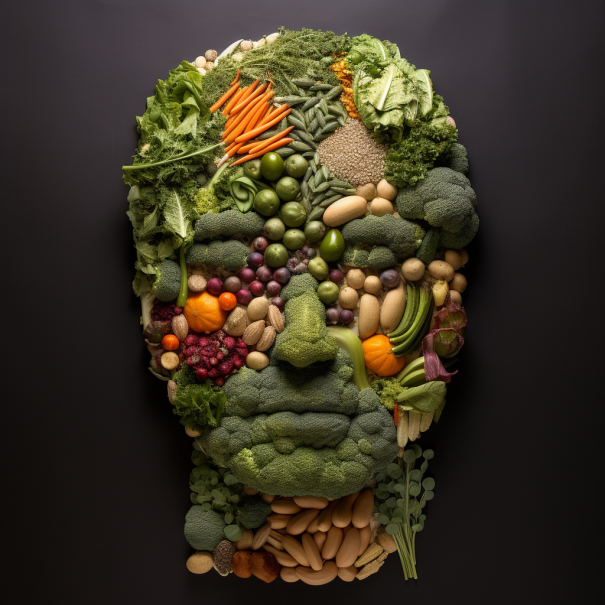The Plant-Based Diet Dilemma: Weighing the Benefits and Risks
A plant-based diet is a way of eating that primarily focuses on foods derived from plants, including fruits, vegetables, whole grains, legumes, nuts, and seeds. While it doesn’t necessarily exclude all animal products, the emphasis is on consuming a predominantly plant-based meal plan.
In recent years, plant-based diets have experienced a surge in popularity, with more people adopting this lifestyle for various reasons. One significant factor contributing to their rise is the growing awareness of the health benefits associated with plant-based eating. Research has shown that a well-planned plant-based diet can reduce the risk of chronic diseases, support weight management, and improve overall well-being.
Another driving force behind the popularity of plant-based diets is the concern for environmental sustainability and animal welfare. Many individuals choose to reduce their consumption of animal products as a way to minimize their ecological footprint and promote more ethical food choices.
The purpose of this article is to explore the benefits and potential risks of a plant-based diet in detail. By delving into the advantages and considering the challenges, we aim to provide readers with a comprehensive understanding of this dietary approach. It is important to note that while plant-based diets can be highly beneficial, it is essential to navigate potential risks and ensure proper planning to meet all nutritional needs.
With the introduction to plant-based diets and their rising popularity established, we will now delve into the benefits of this eating approach, shedding light on how it can positively impact overall health and well-being.
Benefits of a Plant-Based Diet
A well-planned plant-based diet offers numerous benefits for overall health and well-being. Here are some key advantages:
Reduced risk of chronic diseases
Research has shown that a plant-based diet can significantly lower the risk of chronic illnesses, including heart disease, stroke, type 2 diabetes, and certain types of cancer. The abundance of fiber, antioxidants, and phytochemicals found in plant-based foods contributes to their protective effects against these diseases [1].
Weight loss or maintenance and improved body composition
Plant-based diets tend to be lower in calories and saturated fats, making them effective for weight loss or weight management. The emphasis on whole, unprocessed plant foods and the exclusion of animal products can promote a healthier body composition, including a lower body mass index (BMI) and reduced waist circumference.
Enhanced gut health and digestive function
Plant-based diets are typically rich in dietary fiber, which supports a healthy digestive system. Adequate fiber intake promotes regular bowel movements, prevents constipation, and supports a diverse and beneficial gut microbiome. A healthy gut contributes to improved nutrient absorption and overall digestive well-being.
Increased energy levels and improved overall vitality
Plant-based diets, when properly balanced, can provide a wide array of essential nutrients, vitamins, and minerals that support optimal energy levels. The combination of complex carbohydrates, healthy fats, and plant-based proteins nourishes the body and helps sustain energy throughout the day.
Reduced inflammation and potential alleviation of related conditions
Plant-based diets are often associated with lower levels of inflammation in the body. The high intake of anti-inflammatory compounds, such as antioxidants and phytochemicals from fruits, vegetables, nuts, and seeds, may help reduce the risk of inflammatory conditions and alleviate symptoms in individuals with existing conditions like arthritis or inflammatory bowel disease.
Extended lifespan and potential anti-aging effects
Several studies suggest that adhering to a plant-based diet can contribute to a longer lifespan and a decreased risk of premature death. The protective effects of plant-based diets against chronic diseases and their positive impact on overall health are believed to play a role in longevity. Additionally, the abundance of antioxidants in plant-based foods may help combat cellular damage and promote healthy aging.
Environmental benefits and sustainable food choices
Opting for a plant-based diet has positive implications for the environment. Animal agriculture is a significant contributor to greenhouse gas emissions, deforestation, and water pollution. Choosing plant-based foods helps reduce the ecological footprint, conserves resources, and promotes more sustainable food production practices.
With the benefits of a plant-based diet established, it’s important to also consider the potential risks and challenges that may arise. In the following section, we will explore these aspects and provide guidance on how to address them for a balanced and successful plant-based eating approach.
Risks of a Plant-Based Diet
While a plant-based diet offers numerous benefits, it’s essential to be aware of potential risks and challenges to ensure a balanced and healthy approach. Here are some considerations:
Potential nutrient deficiencies
Plant-based diets may require special attention to ensure adequate intake of certain nutrients, including iron, zinc, vitamin B12, and vitamin D. Plant-based sources of iron and zinc, such as legumes, nuts, and seeds, are less bioavailable than animal-based sources, so it’s important to optimize absorption by consuming them with vitamin C-rich foods. Vitamin B12, predominantly found in animal products, may require supplementation or fortified foods. Similarly, obtaining sufficient vitamin D from sunlight exposure or fortified sources is crucial, as it plays a vital role in bone health and other physiological processes.
Increased risk of fractures
Plant-based diets can be low in calcium and vitamin D, which are essential for maintaining bone health. It’s important to ensure an adequate intake of plant-based sources of calcium, such as leafy green vegetables, tofu, fortified plant-based milk, and calcium-set tofu. Additionally, adequate sunlight exposure or vitamin D supplementation is necessary to support calcium absorption and maintain bone strength.
Addressing concerns about protein intake
Protein is an essential macronutrient for various physiological functions, and some individuals may worry about meeting their protein needs on a plant-based diet. However, plant-based sources such as legumes, tofu, tempeh, seitan, quinoa, and plant-based protein powders can provide ample protein when consumed in appropriate quantities and combinations. Incorporating a variety of protein sources throughout the day ensures a balanced amino acid profile.
Social isolation challenges
Adhering to a plant-based diet may pose social challenges, especially in settings where animal products are the norm. It’s essential to find strategies to maintain social connections and navigate social situations. Communicating dietary choices with friends and family, offering to bring plant-based dishes to gatherings, and exploring vegan-friendly restaurants can help foster inclusivity and reduce feelings of isolation.
While understanding the risks and challenges of a plant-based diet is crucial, it’s important to note that with proper planning and attention to nutrient intake, these risks can be effectively managed. By following the recommendations and strategies outlined in the article, individuals can enjoy the benefits of a plant-based diet while addressing any potential concerns.
Conclusion
In conclusion, a plant-based diet offers numerous benefits for overall health and well-being. It can reduce the risk of chronic diseases, support weight management, enhance gut health, increase energy levels, reduce inflammation, potentially extend lifespan, and promote sustainable food choices. However, it’s crucial to approach a plant-based diet with proper planning and attention to potential risks.
While nutrient deficiencies, particularly in iron, zinc, vitamin B12, and vitamin D, may arise on a plant-based diet, these can be addressed through mindful food choices, appropriate supplementation, and fortified foods. The risk of fractures can be minimized by ensuring an adequate intake of calcium and vitamin D from plant-based sources and sunlight exposure or supplementation. Protein needs can be met by incorporating a variety of plant-based protein sources throughout the day.
Moreover, social challenges and potential feelings of isolation can be overcome by effective communication, bringing plant-based dishes to social gatherings, and exploring vegan-friendly options. It’s important to find a balance that supports both personal health goals and social connections.
As with any dietary changes, it is advisable to consult healthcare professionals or registered dietitians to ensure personalized advice based on individual needs and circumstances. They can provide tailored guidance, address specific concerns, and help create a well-rounded and sustainable plant-based eating plan.
By approaching a plant-based diet with awareness and knowledge, individuals can harness its benefits while effectively managing any potential risks. A balanced and well-executed plant-based diet has the potential to contribute to overall health, well-being, and a positive impact on the environment.
Remember, everyone’s journey towards a healthier lifestyle is unique, and finding an approach that works best for you is key. With proper guidance and understanding, embracing a plant-based diet can be a fulfilling and rewarding choice for your health and the planet.
Citation 1
- Meta-analysis of 13 studies:
This study found that vegetarians have a 22% lower risk of death from heart disease and a 20% lower risk of death from all causes, compared to non-vegetarians.
Aune et al., 2013: https://pubmed.ncbi.nlm.nih.gov/23259933/ - The Adventist Health Study-2:
This study, which followed over 75,000 people for 26 years, found that vegetarians had a 32% lower risk of heart disease and a 20% lower risk of stroke, compared to non-vegetarians.
Craig et al., 2009: https://pubmed.ncbi.nlm.nih.gov/19213395/ - The EPIC-Oxford study:
This study, which followed over 65,000 people for 18 years, found that vegetarians had a 23% lower risk of type 2 diabetes, compared to non-vegetarians.
Key et al., 2009: https://pubmed.ncbi.nlm.nih.gov/19218288/ - The China Study:
This study, which followed over 6,500 people for 20 years, found that people who ate a plant-based diet had a 40% lower risk of developing cancer, compared to people who ate a typical Western diet.
Campbell and Campbell, 2005: https://pubmed.ncbi.nlm.nih.gov/15828672/
Related FAQ
Can I get enough protein on a plant-based diet?
Yes, it is entirely possible to meet your protein needs on a plant-based diet. Plant-based protein sources such as legumes, tofu, tempeh, seitan, and quinoa are rich in protein. Combining different plant-based protein sources throughout the day ensures a balanced intake of essential amino acids. Additionally, incorporating nuts, seeds, and plant-based protein powders can further boost protein intake.
How can I ensure I’m getting enough nutrients, like iron and vitamin B12, on a plant-based diet?
While some nutrients may require special attention on a plant-based diet, it is possible to obtain them through careful planning. Iron-rich plant-based foods include legumes, leafy greens, fortified cereals, and dried fruits. Vitamin B12 is predominantly found in animal products, so consider supplementation or consuming fortified foods like plant-based milk or breakfast cereals. Additionally, incorporating vitamin C-rich foods alongside iron-rich foods can enhance iron absorption.
Are there any potential health risks associated with a plant-based diet?
While a well-planned plant-based diet can offer numerous health benefits, there are potential risks to be aware of. These include the risk of nutrient deficiencies, particularly in nutrients like iron, zinc, vitamin B12, and vitamin D. However, these risks can be mitigated through proper planning, including incorporating fortified foods or supplements as needed. It’s also important to pay attention to calcium and vitamin D intake to support bone health and reduce the risk of fractures. Consulting with healthcare professionals or registered dietitians can help ensure an optimal and balanced plant-based eating approach.
Key Take Away
- Plant-based diets offer a range of health benefits, including a reduced risk of chronic diseases such as heart disease, stroke, type 2 diabetes, and certain cancers.
- Following a plant-based diet can support weight loss or maintenance, improve gut health, increase energy levels, and reduce inflammation in the body.
- Adequate planning is crucial to address potential nutrient deficiencies in a plant-based diet, particularly iron, zinc, vitamin B12, and vitamin D. Supplementation and choosing fortified foods can help ensure sufficient intake.
- Concerns about protein intake on a plant-based diet can be addressed by consuming a variety of plant-based protein sources throughout the day, such as legumes, tofu, tempeh, and quinoa.
- While adopting a plant-based diet may present social challenges, strategies such as effective communication, bringing plant-based dishes to social gatherings, and exploring vegan-friendly options can help maintain social connections.
Glossary
- Plant-Based Diet: A dietary approach that primarily focuses on consuming foods derived from plants, including fruits, vegetables, whole grains, legumes, nuts, and seeds. It may limit or exclude animal products.
- Nutrient Deficiencies: Insufficient intake or absorption of essential nutrients needed for optimal health. In the context of a plant-based diet, nutrient deficiencies may include inadequate levels of iron, zinc, vitamin B12, and vitamin D.
- Bioavailability: The degree to which a nutrient is absorbed and utilized by the body. In the context of a plant-based diet, bioavailability refers to the body’s ability to extract and utilize nutrients from plant-based sources.
- Fortified Foods: Foods that have had additional nutrients added to enhance their nutritional content. Fortified foods are often enriched with nutrients like vitamin B12, vitamin D, or iron to address potential deficiencies in plant-based diets.
- Social Isolation: The experience of feeling disconnected or excluded from social activities and relationships due to differences in dietary choices. In the context of a plant-based diet, social isolation can arise when individuals have limited options or face challenges in social settings where animal products are prevalent.
Additional Resources
- Websites of organizations that promote plant-based diets:
- Scientific studies on the benefits and risks of plant-based diets:
- Books on plant-based diets:
- “How Not to Die” by Michael Greger, M.D.
- “The China Study” by T. Colin Campbell, M.D., Ph.D.
- “Eat to Live” by Joel Fuhrman, M.D.


